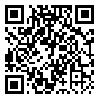BibTeX | RIS | EndNote | Medlars | ProCite | Reference Manager | RefWorks
Send citation to:
URL: http://jbrms.medilam.ac.ir/article-1-227-en.html
Introduction: Recognition of human leukocyte antigens (HLA) is of importance for hematopoietic stem cell transplantation. Any HLA-mismatches between the donor and recipient can cause graft rejection or other complications. In HLA-typing experiments, usage of HLA-known reference cells accompany with HLA-unknown samples is obligatory. Some international centers represent these cells with high expenses. On the other hand, transferring of these cells is problematic and in some instances is not practical. In this study, we introduced umbilical cord-derived mesenchymal stem cells (MSCs) as reference cells for HLA genotyping. These cells are national and can be prepared locally.
Materials and methods: We isolated MSCs from three umbilical cord and after their growth and proliferation, these cells were characterized by flow cytometry technique using antibodies to CD29, CD34, CD44, CD45, CD73, CD90 and CD105. HLA-typing was then carried out by PCR-SSP kits for HLA-A, -B and -DRB allele’s identification.
Results: Isolated MSCs were positive for MSCs markers; CD29, CD44, CD73, CD90, and CD105 and negative for hematopoietic stem cell markers; CD34 and CD45. HLA alleles were determined. One of the samples was homologous for HLA alleles and the others were heterologous.
Conclusion: We can develop a reference panel for HLA-typing by obtaining MSCs from available sources like umbilical cord.
Received: 2016/01/2 | Accepted: 2016/07/1 | Published: 2016/09/30
| Rights and permissions | |
 |
This work is licensed under a Creative Commons Attribution-NonCommercial 4.0 International License. |





